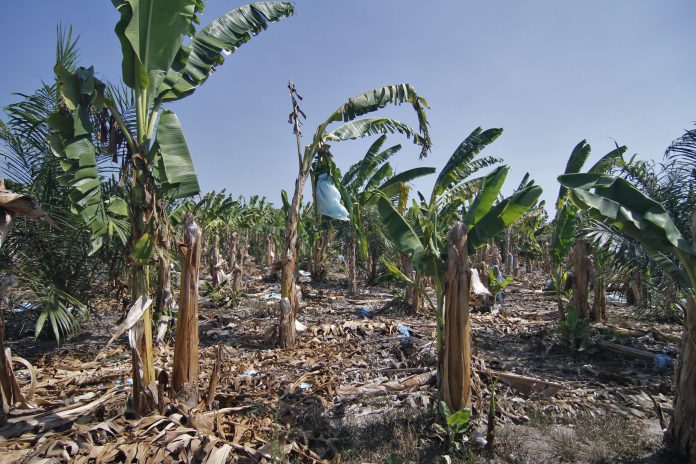The outpourings of narratives from Indigenous Peoples in Mindanao have manifested the painful reality that their ancestral domains have been transformed into massive plantations by global corporations in cohort with the powers-that-be.
This is true in Butong, Quezon, Bukidnon, as about 1,111.4 hectares of the ancestral domain of the Manobo-Pulangiyon tribe have been transformed into massive plantations (banana and pineapple) by the Kiantig Development Corporation, leaving more than 1,000 tribal families under shattered tents along a four-lane highway, eating only “kamote” once a day.
This is also true in San Vicente, Sumilao, Bukidnon, where a powerful corporation landgrabbed the Manobo’s 5,000- hectare ancestral domain, and when they protested, a barrage of bullets rained on them.
These stories are just “tips of the iceberg.” All told, there are now about 200,000 hectares of massive plantations in Mindanao that are heavily using chemical fertilizers, pesticides, herbicides, and insecticides. Thus, it can be said that to “have and have not” has mutated into to “live or live not.”
Every day, these plantations are applying chemicals at every stage, applying Nematicide during land preparation, Phosphoric Acid (fungicide), Actara (Insecticide) and Duiron and Promacil (herbicide) during pre-planting.
Immediately after planting, they apply Duiron and Ametryne. Tons and tons of chemical fertilizers are applied as basal, then bombarding the growing crops with foliar fertilizer at 1,500 kgs. per hectare.
There are about 200,000 hectares of plantations in Mindanao, multiply these by 1,500 kgs., you imagine 2,000 trucks dumping chemicals every day in the water table of Mindanao as these toxic chemicals are non-biodegradable.
Thus, we strongly suspect that the water table may already have been contaminated by these cancerous toxic chemicals — the reason why many have already died of cancer and many of the newly born babies are deformed.
Thus, in Malaybalay, Bukdinon, an ordinance had been passed disallowing these plantations to expand because so much harm has been done already to the ecological integrity. I hope other local government units in other parts of Mindanao also do the same.
In Puerto Rico, many of these global corporations are already banned because many plantation workers have been afflicted by cancer. In Costa Rica, officials have ordered the temporary closure of a pineapple farm over concerns about the safeguarding of nearby wetlands and a Unesco World Heritage site.
The move follows a recent inspection conducted by officials from the country’s Ministry of Environment and Energy, the National Environmental Technical Secretariat, the National System conservation Areas, and the Costa Rica Center of Science and Culture, known locally as the Museo Nacional.
As reported, “pineapple production in Costa Rica attracted controversy … after the country’s Ministry of Agriculture and Livestock banned the use of the commercial herbicide bromacil, which is said to have prompted demonstrations in the capital San Jose against Osa and its alleged impact on the protected sites.”
That’s how vigilant they are in protecting their environment and their health. In fact, many of these corporations operating in Mindanao were already banned to operate in other countries, thus they go to Mindanao.
In one of my visits in these countries as then chairman of the Cooperative Development Authority, the environmentalists were telling me why these corporations chose to go to Mindanao, jokingly describing our country as a nation of cowards. What the local government in Malaybalay did was so amazing, belying that the Philippines is a nation of coward people.
Pity those who have died because of cancer. Pity the newly-born deformed babies. A poor pregnant woman who cannot afford to buy bottled mineral water has no choice but to drink water coming from the water table that is already contaminated, thus, the victim is the innocent fetus. In fact, a number of newly born babies were born deformed – without arms, nose or anus.
All told, the painful truism that the enrichment of the rich means the dispossession of the poor has been turned to “live or live not” as high value crops from Mindanao satisfy the consumerist needs of people in other countries, leaving Filipinos hungry and deformed.
I suggest that every local government unit in Mindanao where these plantations are operating must conduct inspection/verification/investigation on whether these chemicals intensively used by these plantations are cancer-causing or not.
There are reports that of the eight chemicals being used by these plantations, seven are already banned in other countries. Thus, verification/investigation must be done by concerned agencies of government.
Orlando Ravanera is former chairman of the Cooperative Development Authority. After his retirement, he spends more time on his environmental advocacies and in his work for the indigenous people in northern Mindanao. All views and opinions express here are his own and do not reflect the views and opinions of LiCAS News.









